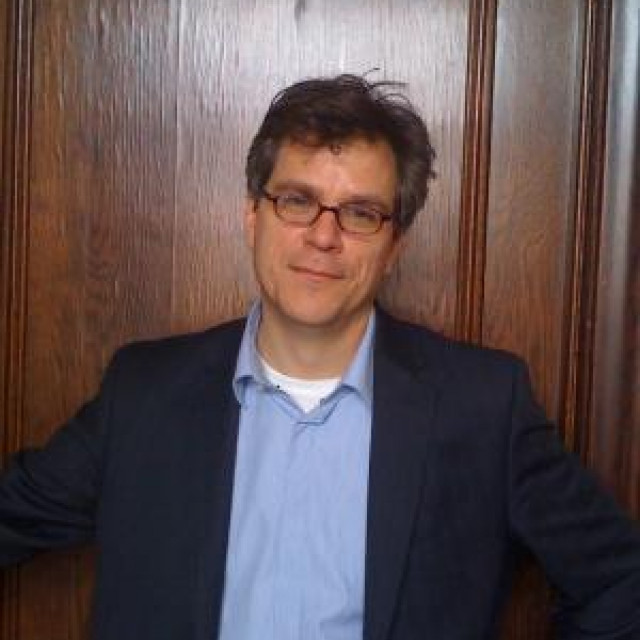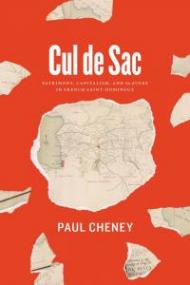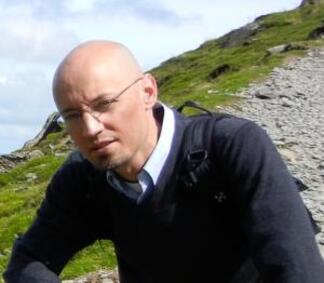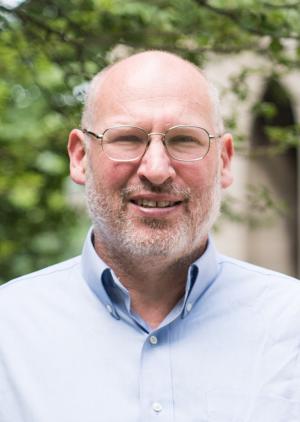
Columbia University, PhD '02
BIOGRAPHY
Paul Cheney is an historian of Europe with a specialization in old regime France and its colonial empire. Before beginning his PhD training in history at Columbia University, he studied political economy at the New School for Social Research. He has taught at Columbia University, the European College of Liberal Arts (Berlin), and the Queen's University of Belfast.
The unifying element of Professor Cheney’s work is an interest in early modern capitalism, and in particular the problem of how modern social and political forms gestated within traditional society. Old regime France serves as an excellent case study in this problem because of the way in which it combined real economic dynamism with deep-seated political and social impediments to growth. He addresses France’s integration into a globalized early modern economy in a methodology diverse way, drawing on intellectual, economic, and social history. His first book, Revolutionary Commerce: Globalization in the French Monarchy (Harvard University Press, 2010), examined how French philosophes, merchants, and administrators understood the adaptability of the French monarchy to the modernizing forces of primitive globalization. Currently, he is working on a second book entitled, Cul de Sac: Patrimony, Capitalism, and Slavery in French Saint-Domingue (University of Chicago Press, 2017), a micro-history of one plantation in France’s richest colony. He has published in such journals as The William and Mary Quarterly, Past & Present, Dix-Huitième siècle, and Les Annales historiques de la révolution française.
Recent Graduate Courses
-
The French Revolution
-
Old Regime France
-
Atlantic Worlds, c. 1700–1800
-
Political Economy and the Invention of Society, c. 1680–1830
-
Montesquieu and the Enlightenment, with Robert Morrissey, Department of Romance Languages and Literatures
-
Revolutionary Culture in Eighteenth-Century France and America, with Eric Slauter, Department of English
Recent Research / Recent Publications
- Cul de Sac: Patrimony, Capitalism, and Slavery in French Saint-Domingue. Chicago: University of Chicago Press, 2017. Published in French as Cul de Sac: Une Plantation à Saint-Domingue au XVIIIe siècle. Arthème Fayard, 2022.
- Revolutionary Commerce: Globalization and the French Monarchy. Cambridge, MA: Harvard University Press, 2010.
- “Inheritance and Incest: Toward a Lévi-Straussian Reading of Montesquieu’s De l’esprit des lois,” History and Theory 64.1 (2025): 46–74. (open access)
- “Le Débat sur capitalisme et esclavage : un débat inachevé,” In Travail servile et dynamiques économiques XVIe-XXIe siècle, edited by Mendes, Almeida, Conchon, Anne, Alessandro Stanziani, and Myriam Cottias, 97–116. Paris: IGPDE-Comité pour l’histoire économique et financière de la France, 2024.
- “Political Economy,” in The Cambridge Companion to Montesquieu, eds. Keegan Callanan and Sharon Krause, Cambridge Companions to Philosophy (Cambridge University Press: 2023), 216-31. (Open access)
- "István Hont, the Cosmopolitan Theory of Commercial Globalization, and Twenty-First-Century Capitalism." Modern Intellectual History (15 March 2021): 1-29.
- "The French Revolution’s Global Turn and Capitalism’s Spatial Fixes." In "Forum: The French Revolution is Not Over." Special edition, Journal of Social History 52, no. 4 (Summer 2019).
- "Haiti's Commercial Treaties: Between Abolition and the Persistence of the Old Regime." In Balance of Power, Balance of Trade: the Politics of Commercial Treaties in the Eighteenth Century. Edited by Antonella Alimento and Koen Stapelbroek. London: Palgrave Macmillan, 2017.
- "Commerce." In The Cambridge Companion to the French Enlightenment. Edited by Daniel Brewer. Cambridge: Cambridge University Press, 2014. (Open access)
- "Aufklärung und die politische Ökonomie des Kolonialismus.” In Der moderne Staat und „le doux commerce”–Staat, Ökonomie und internationales System im politischen Denken der Aufklärung. Edited by Olaf Asbach. Baden-Baden: Nomos, 2014.
- With Alan Forrest, Lynn Hunt, Mathias Middel, and Karine Rance. "La révolution française à l'heure du Global Turn." Annales historiques de la Révolution française 374 (Dec. 2013). [link requires subscription access].
- With Loïc Charles. "The Colonial Machine Dismantled: Knowledge and Empire in the French Atlantic." Past and Present 219 (May 2013). [link requires subscription access]
- "A Colonial Cul de Sac: Plantation Life in Wartime Saint-Domingue, 1775-1783." Radical History Review: Special issue Haitian Lives /Global Perspectives 115 (Win. 2013): 45–54. [link requires subscription access]
- "A False Dawn for Enlightenment Cosmopolitanism? Franco-American Trade during the American War of Independence." The William and Mary Quarterly 63 (July 2006): 459–84. [link requires subscription access]
- "L'Histoire du commerce." In Le Cercle de Vincent de Gournay: savoirs économiques et pratiques administratives en France au milieu du xviii siècle. Edited by Loïc Charles, Frédéric Lefebvre, and Christine Théré. Paris: INED, 2011.
- "Finances, Philosophical History and the 'Empire of Climate': Enlightenment Historiography and Political Economy." Historical Reflections 31, no. 1 (2005): 141–67. [link requires subscription access]
- "Les économistes français et l'image de l'Amérique: l'essor du commerce transatlantique et l'effondrement du 'gouvernement féodal'." Dix-huitième siècle 33 (2001): 229–43.
- "Constitution and Economy in David Hume's Enlightenment." In David Hume's Political Economy. Edited by Margaret Schabas and Carl Wennerlind. London: Routledge, 2008.
- "Lumières écossaises." In Dictionnaire électronique Montesquieu. Edited by the École normale supérieure de Lyon, pour le compte de l’Institut d’histoire de la pensée classique. February 2008 (September 2013, 2nd ed.).
- Awarded the Society for French Historical Studies' 2018 Gilbert Chinard Prize for Cul de Sac.
- Receives NEH grant to conduct a summer seminar for college and university teachers in July 2018.
- Published Cul de Sac: Patrimony, Capitalism, and Slavery in French Saint-Domingue (Chicago, 2017)

- Delivers plenary lecture at Oxford University, United Kingdom
- Discusses his latest research on Saint-Domingue/Haïti at Aarhus University
- Invited to be a visiting professor the Ecole des Hautes Etudes en Sciences Sociales, Centre de Recherches Historiques, spring 2016
- Organizes conference on "Political Economy in the Age of Enlightenment and Revolution: Interdisciplinary Approaches"
- Collaborates with Parisian scholar on Colonial Plantation Economy
- “The French Revolution,” radio interview on WGN Chicago, Extension 720, March 22, 2011.

Harvard University, PhD '09
BIOGRAPHY
My research on intellectual history, or the history of ideas, is my way of exploring how history and thought shape each other over time. The Italian Renaissance is a perfect moment for approaching this question because at that point the ideas about science, religion, and the world that had developed in the Middle Ages suddenly met those of the ancient world, reconstructed from rediscovered sources. All at once many beliefs, scientific systems, and perceived worlds clashed, mixed, and produced an unprecedented range of new ideas, which in turn shaped the following centuries and, thereby, our current world.
My current research focuses on patterns in the history of the real motives of censors over space and time, from antiquity to the digital age, especially the Inquisition and early modern censorship, and 20th century censorship of popular media. The enormous impact of Orwell's Nineteen Eighty-Four has led modern people to imagine censorship working the way his Ministry of Truth does: imposed top-down on a populace, with vast resources, a stable, long-term plan, and the goal of controlling society, stifling thought, and destroying information. But the real actions and records of past censors reveal that the vast majority of real censorship has inverse qualities: shaped by bottom-up social anxiety, constantly desperate for funds and personnel, hastily improvised in response to a perceived crisis, constantly transformed ad hoc as the perceived threat changes, and (from the point of view of the censors) aiming to protect vulnerable individuals, and to encourage self-censorship rather than destroying extant information. Only by examining the real motives which have made people say "Yes" to censorship over space and time can we understand what patterns help it flourish, and ways to combat it. I am especially interested in how innovations in information technology trigger waves of new censorship, a topic I explored in a dialog series and museum exhibit: voices.uchicago.edu/censorship.
As a novelist (science fiction, fantasy, and historical fiction), I am also very interested in how to better connect the worlds of history research and speculative fiction, both to innovate pedagogically, and to help new improved historical narratives and correctives make it into the books, games, and TV which are what shape most people's first impressions of history, but often draw on histories that are more than half a century out of date. I have a forthcoming collection of essays on history and genre fiction, Diaspora of Time: Conversations on Science Fiction and Fantasy coming from Tor Books, several publications on history in SF&F, comics, anime & manga, and am a nonfiction columnist for Strange Horizons. I also employ creative writing, role-playing and LARP in my classes, and work with SFWA (the Science Fiction Writers of America) on helping to connect writers with historians and their research. I also have a forthcoming popular press book, Why Renaissance? Invention of a Golden Age, which aims to present to a general audience how and why the ideas of a golden Renaissance and bad Middle Ages were invented, and how historians are still working to improve and update them, and to update popular conceptions of Renaissance humanism.
My first scholarly book, Reading Lucretius in the Renaissance, explores scholars' use of Lucretius's Epicurean didactic poem De Rerum Natura from its rediscovery in 1417 to 1600, focusing on the challenges its atomistic physics posed to Christian patterns of thought. In a period when atheism was often considered a sign of madness, the sudden availability of a sophisticated system that explained natural phenomena in nontheistic ways and that argued powerfully against the immortality of the soul, the afterlife, and a creator God threatened to supply the one weapon unbelief had lacked in the Middle Ages: good answers. At the same time, humanist scholars who idealized ancient Rome were eager to study a poem whose language and structure so often anticipated their beloved Aeneid. My book uncovers humanist methods for reconciling Christian and pagan philosophy and shows how atomism and ideas of emergent order and natural selection, so critical to our current thinking, became situated in Europe's intellectual landscape at the beginning of the scientific transformations of the seventeenth century. In it I employ a new quantitative method for analyzing marginalia in manuscripts and printed books, whose results expose how changes in scholarly reading practices over the course of the sixteenth century, fostered by the growth of printing, controlled the circulation of texts and gradually expanded Europe's receptivity to radical science, setting the stage for the scientific revolution.
I also work extensively on classical transformations, i.e., how, thanks to humanist enthusiasm for reconstructing the golden age of ancient Greece and Rome, material received from the classical and medieval worlds was transformed in Renaissance hands and in turn transformed the Renaissance world. I am working on a long-term project on the imagined antiquity believed in by Renaissance humanists, and how their efforts to reconstruct the ancient world aimed, not at the ancient world as we now understand it, but at a very different ancient world whose character can be reconstructed from Renaissance paratexts, imitations, paintings, period translations, biographies of ancients, forgeries, and spuria which we often dismiss today as simple errors. Along with the Classical Transformations Group at Texas A&M University and the Transformationen der Antike group at the Humboldt-Universität zu Berlin, I am working to change the way we think about reception studies, and bring greater attention to how each period transforms and is transformed by the materials it inherits from earlier eras.
Much of my research has been conducted in rare books libraries, especially in Rome and Florence, where I worked with Renaissance copies of classical texts, both manuscripts and printed books. I have been a Fulbright scholar in Italy and a graduate reader and later a fellow at the Villa I Tatti Harvard University Center for Italian Renaissance Studies. I completed my PhD and graduate teaching at Harvard University, and taught at Texas A&M University before coming to the University of Chicago. My article "Reading Lucretius in the Renaissance" (Journal of the History of Ideas, 73:3, [July 2012]: 395–416) won the 2013 I Tatti Prize for Best Article by a Junior Scholar, and the prize for the best article in the JHI.
All my projects stem from my overall interest in the relationship between ideas and historical change. Our fundamental convictions about what is true evolve over time, so different human peoples have, from their own perspectives, lived in radically different worlds. The universe which Thomas Aquinas thought he occupied was not the universe in which Plato or Machiavelli or Freud believed they lived, and such beliefs in turn shaped the futures they tried to build out of what they inherited from the past. Our own current efforts to build the future are likewise predicated on what we believe is true, but what we believe is not what any past culture has believed, nor what any future cultures will believe.
Recent Research / Recent Publications
- Inventing the Renaissance: The Myth of a Golden Age. Chicago, IL: The University of Chicago Press, 2025.
- Reading Lucretius in the Renaissance. Cambridge, MA: Harvard University Press, I Tatti Renaissance Studies Series, 2014.
- Coauthored with James Hankins. The Recovery of Classical Philosophy in the Renaissance, a Brief Guide. Florence: Istituto Nazionale di Studi sul Rinascimento, 2007.
- “The Persecution of Renaissance Lucretius Readers Revisited,” in Philip Hardie, Valentina Prosperi, and Diego Zucca eds., Lucretius Poet and Philosopher: Background and Fortunes of ‘De Rerum Natura’, De Gruyter, 2020.
- “Humanist Dissemination of Epicureanism,” in The Oxford Handbook of Epicureanism, ed. Phillip Mitsis. Oxford: Oxford University Press, 2020.
- “The Effects of Authorial Strategies for Transforming Antiquity on the Place of the Renaissance in the Current Philosophical Canon,” in Beyond Reception: Renaissance Humanism and the Transformation of Classical Antiquity, eds. Patrick Baker, Johannes Helmrath, and Craig Kallendorf, 2019.
- “Humanist Lives of Classical Philosophers and the Idea of Renaissance Secularization: Virtue, Rhetoric, and the Orthodox Sources of Unbelief.” Renaissance Quarterly, 70, 3 (2017), 935-76.
- “On Progress and Historical Change,” KNOW: A Journal on the Formation of Knowledge, Fall 2017, pp. 319-337.
- “The Active and Monastic Life in Humanist Biographies of Pythagoras,” Forms and Transfers of Pythagorean Knowledge: Askesis—Religion—Science, eds. Almut-Barbara Renger & Alessandro Stavru. Harrassowitz: Wiesbaden, 2016.
- “The Recovery of Stoicism in the Renaissance,” in The Routledge Handbook of the Stoic Tradition, ed. John Sellars. New York: Routledge, 2016, pp. 117-132.
- "T. Lucretius Carus, Addenda et Corrigenda." In Catalogus Translationum et Commentariorum: Mediaeval and Renaissance Latin Translations and Commentaries, vol. 10. Washington D.C.: Catholic University of America Press, 2014.
- "The Recovery of Stoicism in the Renaissance." In The Routledge Handbook to the Stoic Tradition, edited by John Sellars, forthcoming.
- "The Use and Defense of the Classical Canon in Pomponio Leto's Biography of Lucretius." In Vitae Pomponianae, Biografie di Autori Antichi nell’Umanesimo Romano (Lives of Classical Writers in Fifteenth-Century Roman Humanism), proceedings of a conference hosted by the Danish Academy in Rome and the American Academy in Rome, April 24, 2013, Renaessanceforum (Forum for Renaissance Studies, Universities of Aarhaus & Copenhagen), 2014.
- "Reading Lucretius in the Renaissance." The Journal of the History of Ideas 73, no. 3 (July 2012): 395–416.
- Terra Ignota (novel series, four volumes starting with volume 1 Too Like the Lightning), Tor Books 2016-21.
- “Writing/Realizing Disability + Power,” Strange Horizons, August 2022.
- “The Protagonist Problem,” with Jo Walton, Uncanny Magazine, 2021.
- “Censorship and Genre Fiction: Let’s Broaden our Broader Reality.” Uncanny Magazine, May 2020.
- "Ada Palmer and the Weird Hand of Progress” profile in Wired Magazine, 2022.
- "Why Trump's Decision to Intervene in Campus Speech Policies Is So Dangerous," op-ed, Washington Post, Mar. 28, 2019.
- "Why Is Silcon Valley So Obsessed with the Virtue of Suffer?" New York Times, Mar. 26, 2019.
- "How #Article13 Is Like the Inquisition: John Milton against the EU #CopyrightDirective," Boing Boing, Mar. 24, 2019
- Profile in the university's alumni magazine
- Reviews Enlightenment Now for Harvard Magazine
- Launches censorship research project with Adrian Johns
- Q&A with Chicago Magazine on third novel
- NPR reviews Too Like the Lightning
- Scientific American interview with Palmer about her novel
- Edits Volume of Student Essays as Part of Graduate Colloquium
- Publishes Reading Lucretius in the Renaissance (Harvard, 2014)

University of Chicago, PhD '05
BIOGRAPHY
My first book, Enlightenment's Frontier: the Scottish Highlands and the Origins of Environmentalism (Yale, 2013) investigates the environmental roots of the Scottish Enlightenment. What was the place of the natural world in Adam Smith's famous defense of free trade? This perspective recovers the forgotten networks of improvers and natural historians that sought to transform the soil, plants, and climate of Scotland in the eighteenth century. The Highlands offered a vast outdoor laboratory for rival liberal and conservative views of nature and society. But when the improvement schemes foundered toward the end of the century, northern Scotland instead became a crucible for anxieties about overpopulation, resource exhaustion, and the physical limits to economic growth. In this way, the rise and fall of the Enlightenment in the Highlands sheds new light on the origins of environmentalism.
My second book, Green Victorians: The Simple Life in John Ruskin's Lake District (Chicago, 2016), coauthored with Vicky Albritton, considers the problem of the Anthropocene from the perspective of a late Victorian utopian movement. Green Victorians tells the story of the first "post-carbon" society in Britain, a community in the English Lake District dedicated to Arts and Crafts industry and simple living. This experiment was galvanized by precocious anxieties about anthropogenic climate change, voiced by the eccentric polymath John Ruskin. He convinced his supporters to reject coal and steam in favor of renewable energy and labor-intensive handicraft production. By creating a new culture of sufficiency, Ruskin and his followers sought to demonstrate that a simple material life was still compatible with a great measure of cultural creativity and intellectual freedom. Green Victorians explores the radical and material experience of Ruskin's community without shying away from the darker side of the movement, including its technophobia and paternalism.
My current research deals with a set of closely related themes in environmental history, history of science, and political economy. The British Industrial Revolution saw the birth of the first fossil fuel economy. At the same time, geologists transformed the public understanding of the earth's interior and deep past. My new project sets out to show that these developments—fossil growth and fossil science—converged to produce a fundamental reorientation of politics and culture towards cheap energy and cornucopian growth.
My research has been funded by fellowships from the Institute of Historical Research in London, the Andrew W. Mellon Foundation, the Huntington Library in Los Angeles, the American Council for Learned Societies, and the Notre Dame Institute for Advanced Study.
Recent Research / Recent Publications
- Fredrik Albritton Jonsson and Carl Wennerlind, Scarcity: Economy and Nature in the Age of Capitalism, Harvard University Press, 2023.
- Coauthor with Vicky Albritton. Green Victorians: The Simple Life in John Ruskin's Lake District. Chicago: University of Chicago Press, 2016. Ruskin Society Book Prize 2016 (runner up).
- Enlightenment's Frontier: The Scottish Highlands and the Origins of Environmentalism. New Haven, CT: Yale University Press, 2013.
- Editor with John Brewer, Neil Fromer, and Frank Trentmann, Scarcity in the Modern World: History, Politics, Society and Sustainability 1800-2075, Bloomsbury Press: 2019
- “Ruskin in the Year of COVID 19,” Ruskin Birthday Reflections, Reilly Center, Notre Dame, February 8, 2021
- Contributor to Roundtable on Duncan Kelly, Politics and the Anthropocene for H-Diplo.
- “Natural History” in Old Ways New Roads, ed. Nigel Leask et al (Edinburgh: Birlinn 2021), museum catalogue for 2020 exhibition about Highland tour at the Hunterian Museum in Glasgow
- "The Coal Question Before Jevons." Historical Journal 62, no. 2 (June 2019).
- "Growth in the Anthropocene." In Scarcity in the Modern World: History, Politics, Society, and Sustainability, 1800–2075, edited by John Brewer, Neil Fromer, Fredrik Albritton Jonsson, and Frank Trentmann. London: Bloomsbury Press, 2019.
- “Roundtable: The Anthropocene in British History [with Chris Otter, Alison Bashford, John Brooke, and Jason Kelly]." Journal of British Studies 57, no. 3 (July 2018): 568–96.
- "Abundance and Scarcity in Geological Time 1784–1844." In Nature, Action, and the Future: Political Thought and the Environment, edited by Katrina Forester and Sophie Smith, 70–93. Cambridge: University of Cambridge Press, 2018.
- "Political Economy." In Historicism and the Human Sciences in Victorian Britain, edited by Mark Bevir, 154–85. Cambridge: Cambridge University Press, 2017.
- "Scottish Tobacco and Rhubarb: The Natural Order of Civil Cameralism in the Scottish Enlightenment." Eighteenth-Century Studies 49, no. 2 (Win. 2016): 129–47
- "Adam Smith and Enlightenment Studies." In Adam Smith: His Life, Thought, and Legacy, edited by Ryan Patrick Hanley, 443–60. Princeton, NJ: Princeton University Press, 2016.
- "Island, Nation, Planet: Malthus and the Enlightenment." In New Perspectives on Malthus, edited by Robert J. Mayhew, 128–54. Cambridge: Cambridge University Press, 2016.
- "Climate Change and the Retreat of the Atlantic: The Cameralist Context of Pehr Kalm's Voyage to North America 1748–51" William and Mary Quarterly 72, no. 1 (Jan. 2015).
- "The Origins of Cornucopianism: A Preliminary Genealogy." Critical Historical Studies 1, no. 1 (Spr. 2014).
- "Adam Smith in the Forest." In The Social Lives of the Forests, edited by Susanna B. Hecht, Kathleen D. Morrison, and Christine Padoch. Chicago: University of Chicago Press, 2013.
- "Natural History and Improvement: The Case of Tobacco." In Mercantilism Reimagined: Political Economy in Early Modern Britain and Its Empire, edited by Philip J. Stern and Carl Wennerlind. Oxford: Oxford University Press, 2013.
- "A History of the Species?" Review essay of Deep History: The Architecture of Past and Present, edited by Andrew Shyrock and Daniel Lord Smail, History and Theory 52, no. 3 (Oct. 2013).
- "The Industrial Revolution in the Anthropocene." Journal of Modern History 83, no. 3 (Sept. 2012).
- "Rival Ecologies of Global Commerce: Adam Smith and the Natural Historians." American Historical Review 115, no. 5 (Dec. 2010).
- "Prudence and Magnanimity: Roundtable on Ryan Hanley's Adam Smith and the Character of Virtue." The Art of Theory: Conversations in Political Philosophy (Nov. 2010).
- "Enlightened Hands: Managing Dexterity in British Medicine and Manufactures 1760–1800." In Body Parts: Critical Explorations in Corporeality, edited by Christopher Forth and Ivan Crozier. Lanham, MD: Lexington Books, 2005.
- "The Physiology of Hypochondria in Eighteenth-Century Britain." In Cultures of the Abdomen: Dietetics, Digestion, and Fat in the Modern World, edited by Christopher E. Forth and Ana Cardin-Coyne. Palgrave Macmillan, 2005.
- Co-authors "Reducing the Carbon Footprint of Academic Travel," Inside Higher Ed, Apr. 18, 2019
- Launches planetary history research project with Dipesh Chakrabarty
- Participates in Q&A on how to teach the Anthropocene, EuropeNow, with syllabus
- Discusses Amitav Ghosh’s recent book, The Great Derangement: Climate Change and the Unthinkable, in an article in the Guardian.
- Coauthors, with Vicky Albritton, Green Victorians: the Simple Life in John Ruskin's Lake District (Chicago, 2016). Ruskin Society Book Prize 2016 (runner up).
- Coorganizes "Climate Change: Disciplinary Challenges to the Humanities and Social Sciences" at the Neubauer Collegium
- Delivers the inaugural T. C. Smout Lecture in Scottish History on the "Enlightenment's Frontier: The Scottish Highlands and the Origins of Environmentalism" [audiocast, 55 minutes
- Talks at the Social Life of Forests Conference on "Invisible Forests: Natural Knowledge in the Making of Classical Economics" [video, 27 minutes]
- Co-author with Rachael Osborn, Mark Fiege and Will Wright, Amicus brief of environmental historians, Juliana v. United States, February 22, 2019.

Harvard University, PhD' 90
BIOGRAPHY
I am a historian of Britain and its Empire, of comparative revolutions, comparative empires, and of northern Europe more broadly. I am both a deeply committed archival historian and a scholar who believes profoundly that historians should engage with the social sciences. My first book, Protestantism and Patriotism, was an entangled and comparative study of English and Dutch politics, culture, and society in the mid-seventeenth century. I traced the decline of apocalyptic thinking and the rise of notions of political economy in England and the Dutch Republic. My second major monograph, 1688: The First Modern Revolution, offered both a major revisionist account of England's Glorious Revolution and a reappraisal of the literature on revolutions more broadly. I showed that far from being an unrevolutionary revolution, the Revolution of 1688 radically transformed English state and society. The revolution, I suggest, can only be understood by placing it in a European and global context. Since 1688 was a radical revolution, I suggest, it is imperative to rethink the nature of revolutions since so much of that literature assumed that the later eighteenth-century French Revolution was the first modern revolution. My third monograph, The Heart of the Declaration, argued that by placing the American Revolution and its seminal document, the Declaration of Independence, in an imperial rather than proto-national context it becomes clear that Americans broke away from Britain not because they resented the imperial state but because they wanted a different kind of state—one that would actively promote social and economic prosperity and equality.
I am currently engaged in a number of research projects. For the past decade I have been working on a Global History of the British Empire, ca. 1650–1784. This book, based on research in a wide range of European, North American, and West Indian archives, insists that the British imperial state was just as institutional strong if structurally distinct, from its rivals. Throughout the empire Britons debated and fought over the kind of imperial state they wanted. Some wanted to focus on a political economy that privileged colonial production over one that emphasized colonial consumption; some wanted an empire that favored England, while others thought the empire should be organized as a confederation; some thought chattel slavery was essential to the prosperity of the empire while others decried cattle slavery as economically and morally deleterious; some thought the empire should protect and promote the development of indigenous peoples, while others thought indigenous peoples were a barrier to imperial development. I insist that accounts of the colonies that focus on the binary relationship between a particular colony or set of colonies and Britain will necessarily misunderstand that relationship. The British Empire can only be understood as a global phenomenon. It is essential to think the empire whole. I am working on a second monograph, Partners in Revolution, that compares the Irish Revolution of 1782 and the American Revolution. I highlight the social, cultural, and ideological similarities between the Irish and American situations. The book explains why Americans severed ties with the British Empire and the Irish did not. I suggest that one of the consequences of the abortive Irish Revolution was that the re-emergence of confessional divisions in Ireland. Finally, I am working on a set of essays (maybe a book) with James Robinson of Harris Public Policy, trying to explain British divergence: why was it that Britain, and not China, India, France, or the Dutch Republic, became the first industrial nation? Why did the British state take the distinctive form that it did?
My research has been supported over the years with fellowships from the Harvard Society of Fellows, the ACLS, the Guggenheim Foundation, the Dorothy and Lewis B. Cullman Center, the Institute for Advanced Studies at Princeton, the Woodrow Wilson Foundation, and the American Philosophical Society. I have been a visitor at All Souls College (Oxford), EHESS (Paris), IMT (Lucca) and the University of Warwick.
I am deeply committed to both undergraduate and graduate education. I am happy to supervise senior theses and doctoral dissertations on any topic in British history, the history of the British Empire, Atlantic history, Dutch history, political economy, revolutions, comparative empires, history of European ideas, seventeenth- and eighteenth-century religious history, and the cultural history of seventeenth- and eighteenth-century Europe.
I have supervised over twenty doctoral dissertations covering a wide range of topics. Some topics have included the origins of humanitarianism in seventeenth- and eighteenth-century Europe, the rise of the Patriot party in the eighteenth-century British Empire, the emergence of associational life in the British Empire, the East India Company and the emergence of British India, politics of the navy and the British Empire, the transformation of British India in the late eighteenth century, the Anglo-French-Indian struggle for the Ohio Valley, British imperial indigenous policy in Scotland, North America, and Bengal, the high church reaction to the Revolution of 1688, the remaking of the Church of England after the Act of Toleration, the Scottish Kirk in the early eighteenth century, the rise of opera in Britain, the making of the English Caribbean in the late seventeenth century, British monetary policy in the late seventeenth and eighteenth centuries, the rise of slave labor in the British Empire, Leisler's Rebellion and its consequences, British party politics in the early eighteenth century, the persistence of Catholicism in the British Empire, and many more.
I am a co-convenor of the History and Social Sciences and the Empires and the Atlantics forums.
Recent Research / Recent Publications
The Heart of the Declaration: The Founders’ Case for Activist Government. New Haven, CT: Yale University Press,, 2016.
co-edited with Peter Lake. The Politics of the Public Sphere in Early Modern England: Public Persons and Popular Spirits. Manchester: Manchester University Press, 2012
1688:The First Modern Revolution. New Haven, CT: Yale University Press, 2011.
- Morris D. Forkosch Prize, American Historical Association
- Gustav Ranis International Book Prize, Yale MacMillan Center
- Bronze Medal, Independent Publisher Book Awards
England’s Glorious Revolution 1688–1689: A Brief History with Documents. Boston: Bedford/St. Martin's, 2006
co-edited with Alan Houston. A Nation Transformed: England after the Restoration. Cambridge: Cambridge University Press, 2001.
Protestantism and Patriotism: Ideologies and the Making of English Foreign Policy, 1650–1668. Cambridge: Cambridge University Press, 1996.
-
Co-edits volume The Politics of the Public Sphere in Early Modern England (Manchester University Press, 2019)
-
Discusses "How the Radical Aims of the American Revolutionaries Are Relevant Today," Valdai Discussion Club, June 8, 2017 [video, 94 mins]
-
Delivers "The Founders' Case for Strong Government," George Washington Forum, Ohio University, February 23, 2017 [video, 81 mins]
